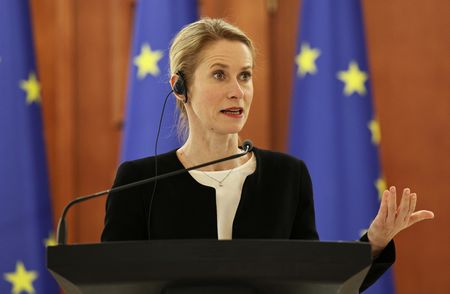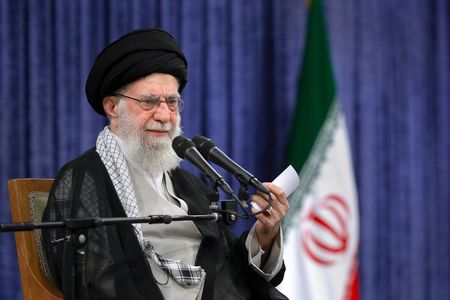BRUSSELS (Reuters) -The European Union will review a pact governing its political and economic ties with Israel due to the “catastrophic” situation in Gaza, EU top diplomat Kaja Kallas said on Tuesday after a meeting of the bloc’s foreign ministers.
International pressure on Israel has mounted in recent days amid complaints about the lack of humanitarian aid reaching Gaza and as Prime Minister Benjamin Netanyahu’s government launched a new military offensive in the enclave.
Kallas said a “strong majority” of the ministers meeting in Brussels favoured such a review of the agreement with Israel, known as an association agreement, in light of events in Gaza.
Diplomats said 17 of 27 EU members backed the review, which will focus on whether Israel is complying with a human rights clause in the agreement, and was proposed by Dutch Foreign Minister Caspar Veldkamp.
“The situation in Gaza is catastrophic. The aid that Israel has allowed in is of course welcomed, but it’s a drop in the ocean. Aid must flow immediately, without obstruction and at scale, because this is what is needed,” Kallas told reporters.
There was no immediate comment from Israel on the EU decision. Israeli officials have said their operations in Gaza are necessary to destroy Hamas, the Palestinian group responsible for the Oct. 7, 2023 attacks on Israel.
Under the pact, which came into force in 2000, the EU and Israel agreed that their relationship “shall be based on respect for human rights and democratic principles, which guides their internal and international policy”.
In a letter proposing a review, Veldkamp raised concerns about Israeli policies “exacerbating an already dire humanitarian situation”.
He also cited “statements by Israeli cabinet members about a permanent presence that alludes to a reoccupation of (parts of) the Gaza Strip, Syria and Lebanon” and a “further worsening of the situation in the West Bank”.
On Tuesday, Dutch minister Veldkamp called the review “a very important and powerful signal,” echoing sentiments of officials from France and Ireland.
But others did not back a review. Czech Foreign Minister Jan Lipavsky suggested the bloc could hold a meeting with Israel under the association agreement to raise concerns.
Kallas said EU sanctions on violent Israeli settlers had been prepared but have so far been blocked by one member state. Diplomats said that country was Hungary.
(Reporting by Benoit Van Overstraeten, Andrew Gray, Lili Bayer, Bart Meijer, Padraic Halpin and John Irish; Editing by Makini Brice and Gareth Jones)










